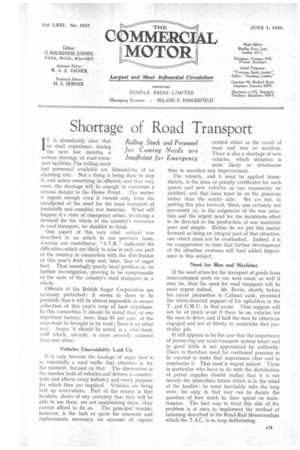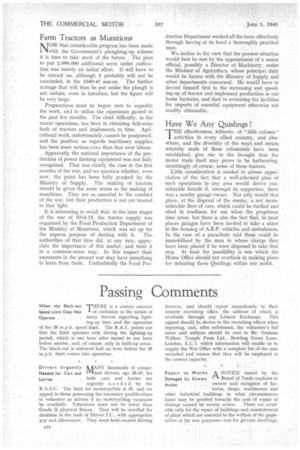Shortage of Road Transport T is abundantly clear that we
Page 15

Page 16

If you've noticed an error in this article please click here to report it so we can fix it.
shall experience, during serious shortage of road-trans, Insufficient for Emergency port facilities. The rolling stock and personnel available are diminishing at an alarming rate. Not a thing is being done to stop it, and unless something be effected, and that very soon, the shortage will be enough to constitute a serious danger to the Home Front. The matter is urgent enough even if viewed only from the standpoint of the need for the road transport of foodstuffs and essential war material. What will happen if a state of emergency arises, involving a demand for the whole of the country's resources in road transport, we shudder to think.
One aspect of this very vital subject was described in an article in our previous issue, wherein our contributor, " S.T.R.," indicated the difficulties which are likely to arise in only one part of the country in connection with the distribution of this year's fruit crop and, later, that of sugar beet. That seemingly purely local problem is, on further investigation, proving to be symptomatic of the state of the country's road transport as a whole.
Officials of the British Sugar Corporation are seriously perturbed : it seems to them to be probable that it will be almost impossible to ensure collection of this year's crop of beet anywhere. In this connection it should be noted that, at one important factory, more than 95 per cent, of the crop must be brought in by road ; there is no other way. Sugar,It should be noted, is a vital foodstuff which, alnady, is more severely rationed than any other.
Vehicles Unavoidably Laid Up It is only because the haulage of sugar beet is so essentially a road traffic that attention is, for the moment, focused on that. The diminution in the number both of vehicles and drivers is countrywide and affects every industry and every purpose for which they are required. Vehicles are being laid up everywhere. Part of the reason is that hauliers, shorn of any certainty that they will be able to use them, are not maintaining them : they cannot afford to do so. The principal trouble, however, is the lack of parts for renewals and replacements necessary on account of repairs than to manifest any improvement.
The remedy, and it must be applied immediately, is the issue of priority certificates for such spares and new vehicles as can reasonably be justified, and that issue must be on the generous rather than the scanty side. We are not, in putting this plea forward, blind, and certainly not perversely so, to the exigencies of the war situation and the urgent need for the maximum effort to be directed to the production of war materials pure and simple. Rather do we put this matter forward as being an integral part of that situation, one which must not be overlooked. Indeed, it is no exaggeration to state that further development of the situation overseas will lend added importance to this subject.
Need for Men and Machines If the need arises for the transport of goods from unaccustomed ports on our west coast, as well it may be, then the need for road transport will be most urgent indeed. Mr. Bevin, shortly before his recent promotion to Cabinet rank, promised the whole-..hearted support of his upholders in the T. and G.W.U. in that event. That support will not be of much avail if there be no vehicles for the men to drive, and if half the men be otherwise engaged and not at liberty to undertake that particular job.
It still appears to be the case that the importance of preserving our road-transport system intact and in good fettle is not appreciated by authority. There is therefore need for continued pressure to be exerted to make that importance clear and to emphasize it. That need is urgent indeed. Those in particular who have to do with the distribution of petrol supplies Fhould realize that it is not merely the immediate future which is in the mind of the haulier : he must inevitably take the long view, for only in that way can he decide the question of how much he dare spend on maintenance. The best way to treat this side of the problem is at once to implement the method of rationing described in the Road-Rail Memorandum which the T.A.C. is so long deliberating.
Farm Tractors as Munitions
NOW that considerable progress has been made with the Government's ploughing-up scheme it is time to take stock of the future. The plan to put 2,000,000 additional acres under cultivation was merely an initial effort. It will have to be carried on, although it probably will not be concluded, in the 1940-41 seas on. The further acreage that will then be put under the plough is not certain, even in intention, but the figure will be very large.
Preparations must be begun now to expedite the work, and to utilize the experience gained in the past few months. The chief difficulty, in the recent operations, has been in obtaining deliveries both of tractors and implements to time. Agricultural work, unfortunately, cannot be postponed, and the position as regards machinery supplies has been more serious even than that over labour.
Apparently the national importance of the production of power farming equipment was not fully recognized. That was clearly the case in the first months of the war, and we question whether, even now, the point has been fully grasped by the Ministry of Supply. The making of tractors should be given the same status as the making of munitions. They are as essential to the conduct of the war, but their production is not yet treated in that light.
It is interesting to recall that, in the later stages of the war of 1914-18, the tractor supply was organized by the Food Production Department of the Ministry of Munitions, which was set up for the express purpose of dealing with it. The authorities of that time did, at any rate, appreciate the importance of this matter, and treat it in a common-sense way. In this respect their successors in the present war may have something to learn from them. Undoubtedly the Food Pro duction Department worked all the more effectively through having at its head a thoroughly practical man.
We incline to the view that the present situation would best be met by the appointment of a senior official, possibly a Director of Machinery, under the Minister of Agriculture, whose principal duty would be liaison with the Ministry of Supply and other departments concerned. He would have to devote himself first to the increasing and speeding-up of tractor and implement production in our home factories, and then to reviewing the facilities for imports of essential equipment otherwise not readily obtainable.
Have We Any Quislings ?
THE effectiveness, hitherto, of "fifth column" activities in every allied country, and elsewhere, and the diversity of the ways and means whereby nests of these columnists have been established, give rise to the thought that the motor trade itself may prove to be harbouring, unwittingly of course, some of these traitors.
Little consideration is needed to arouse appreciation of the fact that a well-schemed plan of such operations in any area would derive considerable benefit if, amongst its supporters, there was a nearby garage owner. Not only would that place, at the disposal of the enemy, a not inconsiderable fleet of cars, which could be fuelled and oiled in readiness for use when the propitious time arose, but there is also the fact that, in most places garages have been invited to take a share in the housing of A.R.P. vehicles and ambulances. In the case of a parachute raid these could be immobilized by the man in whose charge they have been placed if he were disposed to take that step. At least the possibility is one which the Home Office should not overlook in making plans for defeating these Quislings within our midst.




























































